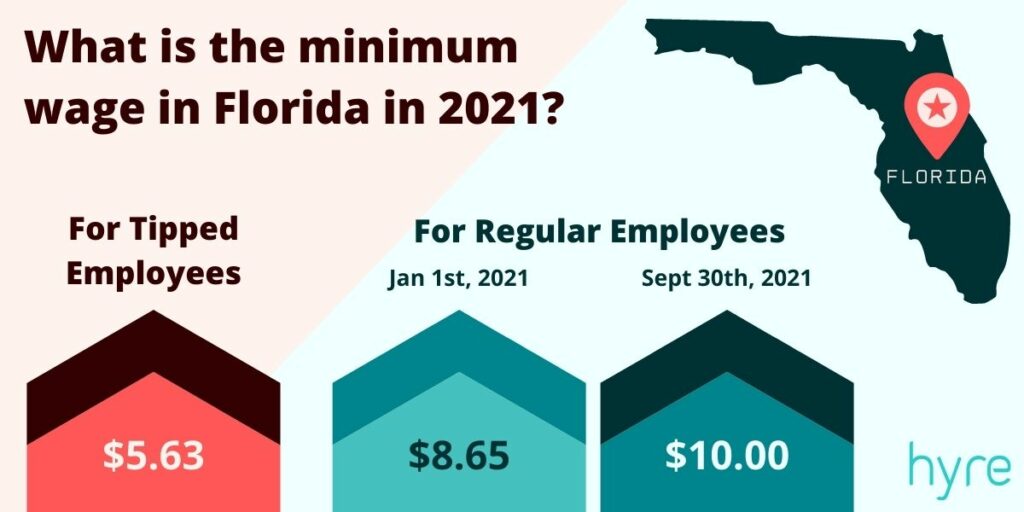Understanding wages can be a bit confusing, but it’s important, especially for workers and employers. In Florida, like in many other places, there are rules about how much people can be paid for their work. This is called the minimum wage. So, what is the minimum wage in Florida 2023? Let’s break it down in a simple way.
What is Minimum Wage?
Minimum wage is the lowest amount of money that employers can legally pay their workers. It’s designed to make sure that people earn enough to live on, even if they are doing entry-level jobs. The idea is to help workers cover basic needs like food, housing, and other essential expenses. Each state in the U.S. can set its own minimum wage, and sometimes it’s different from the federal minimum wage, which is the national standard. Also read What is the Minimum Wage in Florida 2023?
Florida’s Minimum Wage in 2023
As of 2023, the minimum wage in Florida is $11.00 per hour. This means that if you work in Florida, your boss must pay you at least this amount for every hour you work. It’s important to note that this number can change. Every year, Florida reviews its minimum wage to see if it should increase.
How Did We Get Here?
The minimum wage in Florida has been increasing gradually over the years. It was set at $8.25 in 2016. Since then, it has been raised annually, reflecting the cost of living and inflation. This means that the state wants to make sure people can afford the basic things they need as prices for goods and services go up. The decision to raise the minimum wage is usually influenced by various factors, including economic conditions, public opinion, and advocacy from worker groups.
Why is Minimum Wage Important?
Minimum wage is crucial for several reasons. First, it helps reduce poverty. When workers earn a decent wage, they can afford to pay for their needs and support their families. Second, it can boost the economy. When people have more money, they tend to spend it on goods and services, which helps local businesses grow. Lastly, having a minimum wage can improve worker morale. Employees who feel they are being paid fairly are often more motivated and productive.
The Impact of the Minimum Wage Increase
When the minimum wage increases, it affects not just workers but also businesses. Some business owners might worry about higher costs. They may need to raise prices or cut back on hours for some employees. On the other hand, many businesses find that when workers earn more, they are happier and work harder. This can lead to better customer service and increased sales.
Who is Affected by Minimum Wage?
Many different types of workers are affected by the minimum wage. These include people in various jobs like fast food workers, retail employees, and entry-level positions in many fields. It’s especially important for young workers and those in part-time jobs, as they often earn minimum wage. Additionally, some industries, like hospitality, rely heavily on minimum wage workers.
Are There Exceptions to Minimum Wage?
While most workers in Florida are entitled to the minimum wage, there are some exceptions. For instance, tipped employees, like waiters and bartenders, have a different minimum wage. In Florida, these workers can be paid a lower base wage of $7.98 per hour, but they must make up the difference in tips. If their tips don’t bring their total earnings up to the standard minimum wage of $11.00 per hour, the employer must make up the difference.
The Role of the Federal Minimum Wage
It’s important to remember that the federal minimum wage is $7.25 per hour. However, states can choose to set a higher wage, and Florida has done just that. This means that if you live and work in Florida, you are guaranteed to earn at least $11.00 an hour, which is significantly higher than the federal level. This also shows that Florida is committed to ensuring that its workers have better pay.
How Does Florida Compare to Other States?
When looking at minimum wage across the U.S., Florida’s rate of $11.00 is on the higher side, but it is not the highest. States like California and Washington have minimum wages above $15.00 per hour. Each state sets its wage based on its economic situation and cost of living. It’s important to compare these rates because they reflect how much a state values its workers and their ability to live comfortably.
Future of Minimum Wage in Florida
Looking ahead, the minimum wage in Florida is expected to keep increasing. In 2026, it is projected to reach $15.00 per hour. This gradual increase is meant to help workers keep up with rising living costs. Keeping track of these changes is essential for both workers and employers. It ensures everyone is prepared for shifts in the economic landscape.
How to Ensure You’re Paid Fairly
If you’re a worker in Florida, it’s important to know your rights regarding minimum wage. Make sure you keep track of the hours you work and what you’re paid. If you think you’re not being paid the minimum wage, you should talk to your employer first. If that doesn’t resolve the issue, you can reach out to the Florida Department of Economic Opportunity or a local labor organization for help.
What Employers Need to Know
For employers, understanding minimum wage laws is crucial. Not only is it a legal requirement, but it also helps create a positive work environment. Paying fair wages can lead to lower turnover rates, which saves money on training and hiring new employees. Keeping up with wage increases also shows that a business values its workers, which can enhance its reputation.
The Importance of Advocacy and Awareness
Advocacy groups play a significant role in shaping minimum wage laws. These organizations raise awareness about workers’ rights and push for higher wages. They often work with lawmakers to propose changes that benefit low-income workers. Public awareness campaigns also help inform people about the importance of fair pay. When communities support fair wages, it can lead to positive changes in legislation.
Conclusion
So, what is the minimum wage in Florida 2023? It’s $11.00 per hour, and this number is important for workers and employers alike. Understanding minimum wage helps everyone know their rights and responsibilities in the workplace. As the cost of living continues to rise, Florida’s commitment to increasing minimum wage is a step in the right direction for supporting its workers. By staying informed and advocating for fair wages, we can all contribute to a stronger economy and a better quality of life for everyone in Florida.
Whether you’re a worker earning minimum wage or an employer figuring out how to pay your staff, knowing the basics of minimum wage is key. Remember, it’s not just about the numbers; it’s about ensuring everyone can earn a fair wage for their hard work.





